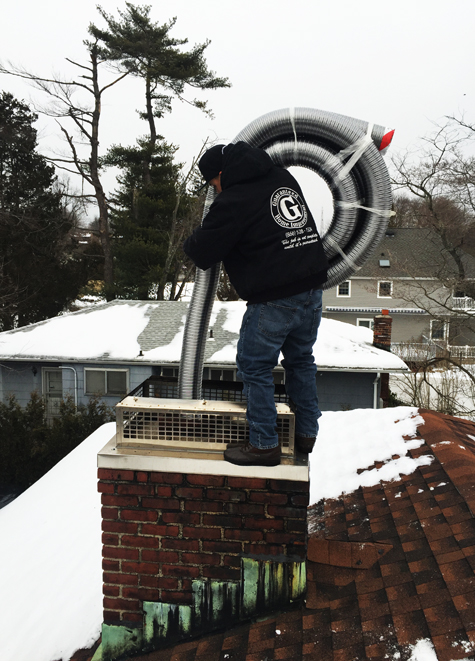fake rolex
Oil to Gas Chimney Liner Conversions
Professional Chimney Services for Westchester Area
Oil to Gas Conversions are common, especially in the Northeast and is a cost-effective strategy for many fireplace owners. These liners will maximize heating efficiency while saving you money each month on your heating bill. These new systems will also prolong the life of your chimney and greatly reduce the chances of a chimney fire.
When furnace or boiler installations are converted from one fuel to another, relining is strongly suggested. If you have or are in the process of converting your heating system from oil to gas, your chimney could present unknown hazards unless you have had the chimney properly inspected and maintained.
After oil to gas conversions sulfur deposits left from years of oil burning mix with water vapor produced by the new gas appliance. This forms an acid which attacks the bricks and mortar in the chimney. The brick and mortar deterioration can lead to blockages in the venting system which could cause a release of carbon monoxide.
Natural Gas Benefits
- Most (84%) of the natural gas consumed in the United States is produced in the US. (source) Some commentators have suggested that this makes the cost of natural gas less volatile.
- Natural gas companies often offer rebates to switch to gas -- occasionally including a new gas furnace or boiler.
- With oil and propane you often (though not always) pre-pay. With natural gas you typically pay a month after you've used the gas.
- If you're buying new equipment, the most efficient gas-burning furnaces are quite a bit more efficient than the most efficient oil-burning furnaces.
- Natural gas can burn more completely than fuel, which means that your furnace can be more efficient.
- You may be able to heat your home more cheaply with natural gas. However, there are quite a few variables to be considered, so don't assume that this is true.
Once you have made the decision to transition from oil to gas, you must then choose the liner you want for your chimney. We provide our customers with these two choices:
- Thick-gauge (10-gauge or heavier) stainless steel is the most common type and can be used in flues of all heights and diameters. Because stainless steel liners can weigh several thousand pounds, they need to be braced at intervals, and the existing building structure may require reinforcement.
- Light-gauge (24-gauge or lighter) stainless steel factory-designed chimney liners are typically fastened together with pre-designed collars, straps, ties and supports. They require engineered supports at frequent intervals, which can make them impractical for relining chimneys with difficult-to-access interiors.
If you are in the market for a new chimney liner after converting from oil to gas, call Guaranteed Chimney of Westchester and have the job done quickly and correctly no matter where you're located in Westchester County! Check out all of the services we have offer. We can professionally service every aspect of your chimney and fireplace! Keeping your fireplace safe for use during the winter.
Chimney Service Estimate